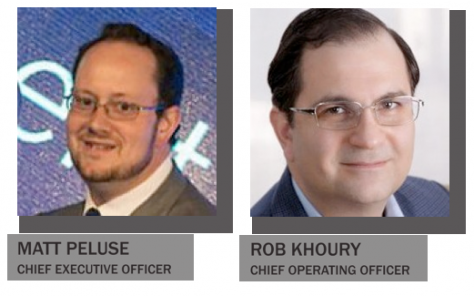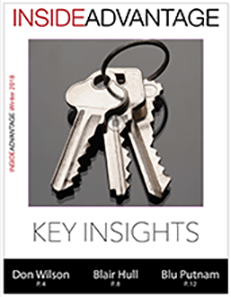
Matt Peluse and Rob Khoury of Esulep Management
Esulep Management is led by CEO and Principal Matt Peluse, COO and Principal Robert J. Khoury, and Head Analyst Dr. Fareed Hawwa, with nearly forty years of combined experience. In this interview with high volume futures and options commodities broker, Advantage Futures , Matt Peluse and Robert Khoury talk about how they began their journey in the world of trading and what makes Esulep Management unique.
DISCLAIMER: This article is presented for information purposes only. It is intended for your personal, non-commercial use. No information or opinions contained in this publication constitute a solicitation or offer to buy or sell securities, futures or to furnish any investment advice or service. PAST PERFORMANCE IS NOT NECESSARILY INDICATIVE OF FUTURE RESULTS. FUTURES INVESTMENT INVOLVES RISK AND IS NOT SUITABLE FOR ALL INVESTORS.
ADVANTAGE FUTURES: Tell us about your background and experience.
Matt Peluse: I completed my academic career at Princeton with inter-university Chemical Engineering thesis work constructing microscale rocket thrusters for NASA and the U.S. Navy, while running one of their Eating Clubs and earning All-Ivy Honors in athletics. I started as a futures and equities derivatives trader in the early 2000s at a proprietary trading firm in the Chicago Board of Trade. Possessing a great background in technology, loving video games and competitive tests and having a more conservative mindset as an engineer, this type of career was very intriguing. We traded almost everything under the sun and approached “work” like any other job: Look for steady, consistent gains that add up to competitive earnings over time. I learned from the front lines about market mechanics and dynamics. In 2007, I took the successful analytics and risk management techniques, as well as everything good or great about the proprietary world, and translated it into a slightly different model available for scalable external investment.
I focused on this venture for ten years. The philosophy remains the same: Look for steady, competitive returns with as little risk as possible. While risk management is often neither seen nor thoroughly appreciated by typical investors during most regimes and market cycles, it still remains the deciding factor for why many firms only last a few years or persist for many decades.
Rob Khoury: I got my break in the financial industry when I joined First Chicago Capital Markets after graduating from Duke business school in 1997. It was an incredible experience as I rotated across the trading floor learning about futures, funding, equity derivatives, FX, corporate and municipal bonds and sales. Outstanding colleagues helped me learn the way different markets work. I later joined boutique asset manager NewArc Investments where I learned about artificial intelligence and Equity Sector Rotation investing from one of the best in the industry, Jeff Miller. Jeff and his partner Vince Castelli were way ahead of their time—in effect creating their own ETFs and trading them profitably for clients, long before ETFs gained popularity. Then, I got a once in a lifetime opportunity to work directly with Stephen Schuler at GETCO. Much of what I do on a day-to-day basis at Esulep is a function of what I learned from Stephen—empowering associates, asking tough questions, listening intently, operating with integrity, being positive, planning ahead and having redundancies in place (to name a few). I went on to launch a recruiting firm for high-frequency traders, quants and developers that I sold after 5 ½ years to an outstanding partner, Brennan Hughes. I have been with Esulep ever since. All these exceptional people and experiences shaped who I am today.
Advantage: What do you believe gives your firm a competitive edge? What about Esulep appeals to your investors?
Rob: Our investors enjoy the fact we have thought through every aspect of our business and bring our risk-averse approach to trading. Our steady consistent performance—over 95% of our months have been positive since inception—speaks to our useful proprietary signals. That is certainly a competitive advantage. We learn from our past successes and failures, but we only look forward: What is coming up in the next six weeks and how do we best prepare? What if the market makes a significant move up or down? This kind of thinking is done daily. Matt emphasized focusing on the next goals for the firm and keeping everything professional from the beginning. There is a lot of teamwork in our highly productive environment, and we operate with integrity. Lastly, investors immensely appreciate our frequent communication (monthly return estimates on the first business day, statements, commentary and factsheets, plus a quarterly conference call) and an open-door policy.
Advantage: What do you believe is Esulep’s most important performance measurement?
Rob: Our most important performance measurement is profitability for our investors—being positive. We measure our performance relative to a baseline of zero. Relative performance is not an approach we feel is useful. If the S&P 500 is down 40% and we are only down 15%, how does that help our investors? We are structured such that we only make money when our clients do.
Advantage: Describe, in general, the Esulep approach to trading.
Matt: The financial industry seems to approach investing with a mantra of always being fully invested for fear of missing the next big move upwards— particularly when it comes to the S&P 500 and equities in general. We prefer to wait for our proprietary signals which inform us when to buy or sell the S&P 500 index. Depending on signals, we may have numerous
positions on (up to our conservative limits) or relatively few positions on where we patiently await a signal to be long or short the market. We hedge our positions prior to, and in anticipation of, putting on our core positions. It is far cheaper to buy insurance before you really need it. Our approach is to assume we are wrong on every trade we put on—and that is quite unique.
Advantage: What is the time horizon of your typical trade?
Matt: Many trading firms have a much shorter time horizon than a typical investor or buy-and-hold stock picking philosophy. Ours tends to be about three weeks on average, with a range from about one week to roughly six weeks.
Advantage: How has your trading evolved over time?
Matt: My career began with intraday, minute by minute, second by second trading. It was a rare occasion to take longer term positions—most of which were spreads and/or basis/carry trades. The goal was to make as much money as possible. I treated it like any other job: A butcher cuts meat, serves his customers and receives a paycheck every couple weeks. Tradesmen, teachers and attorneys, alike, are compensated for their hard work and the skillsets they learned over time.
As a trader, my mindset was a bit different than typical traders’ psyches in that I preferred coming in, doing my work, doing my homework and just taking what the strategies allowed each day in a very boring and unemotional manner. This developed into a very steady model for success where consistency meant nobody ever knew if I had a “bad” day or if I just made a killing. For me, it was about the strategy and winning little independent games one at a time instead of rolling the dice or making a lot of money all at once. Many traders forewent the homework and many panicked when they had a bad day (which inevitably made it worse). I just tried to treat every day like any other job.
Advantage: Where do you see your assets under management headed over the next 12 to 24 months? Is there a capacity limit to your strategy?
Matt: Our firm’s asset growth has been on a steady incline for many years, with the focus on institutional investment since 2014. It still takes significant time for investors to understand what we do, the markets in which we invest and why so few firms do what we do. More accurately, it takes time for institutions to understand why most have never heard of firms that do what we do.
Most niche managers have capacities, or at least “optimal” capacities to continue the effectiveness of their strategies. It’s not that bigger means better, there is just usually some sweet spot where management is happy with growth and clients continue enjoying healthy returns. It has never been our goal to be the biggest manager out there, just one of the best. We still have capacity with our products to accommodate further institutional investing.
Advantage: How has increased market regulation impacted your business?
Matt: Regulatory demands often have both positive and negative effects, and often create unintended consequences for the participants involved. For instance, one of the immediate driving effects of the October 2008 collapse was the increase in collateral requirements by the exchanges, when most participants were already underwater on their positions. Because existing positions required the same collateral as newly established speculative positions, firms already with a huge loss were forced to sell, exacerbating the collapse. In other parts of regulation, it is increasingly cumbersome to comply with many rules the regulators themselves have a hard time keeping up with (not usually their fault as resources, funding and market functionality rapidly evolve these days).
Advantage: Does the firm provide any newsletter or other client communication?
Matt: We like to keep our clients updated about the firm’s operations, while developing a balance between useful information and the many emails that seem to fill our inboxes these days. With at least three touches per month for our clients, we also promote an open- door policy. We welcome meetings when folks are in town or when institutions want to visit.
Advantage: Looking forward, what changes do you see for managed futures and the futures industry in general?
Matt: The futures industry in general should experience enormous growth in the near term. With everyone looking for low cost ETFs, liquid index investing and the best way to optimize the use of capital, it boggles my mind more people do not know about futures. In my experience, some serious investment professionals with great success and knowledge of their industry don’t know about futures. And, for some reason, it seems professional wealth managers, consultants and institutional investors still do not fully understand the advantages of futures. For instance, did you know you could get about the same S&P 500 index returns from buying shares of the ticker SPY or buying the equivalent futures? The futures purchase and its collateral requirements allow you to put some of that capital in a money market fund or elsewhere with the ability to earn extra interest or returns. Most people are not aware. Of course, there are also the tax advantages of utilizing IRS Section 1256 Contracts. With more education, volumes should increase over time.
Esulep Management is led by CEO and Principal Matt Peluse, COO and Principal Robert J. Khoury, and Head Analyst Dr. Fareed Hawwa, with nearly forty years of combined experience. The Esulep companies manage capital from many countries around the world with accommodative vehicles for investment and track records of success through various economic conditions.
33 West Monroe St, Suite 1120, Chicago, IL 60603
312.763.3232
info@esulep.com
www.esulep.com






